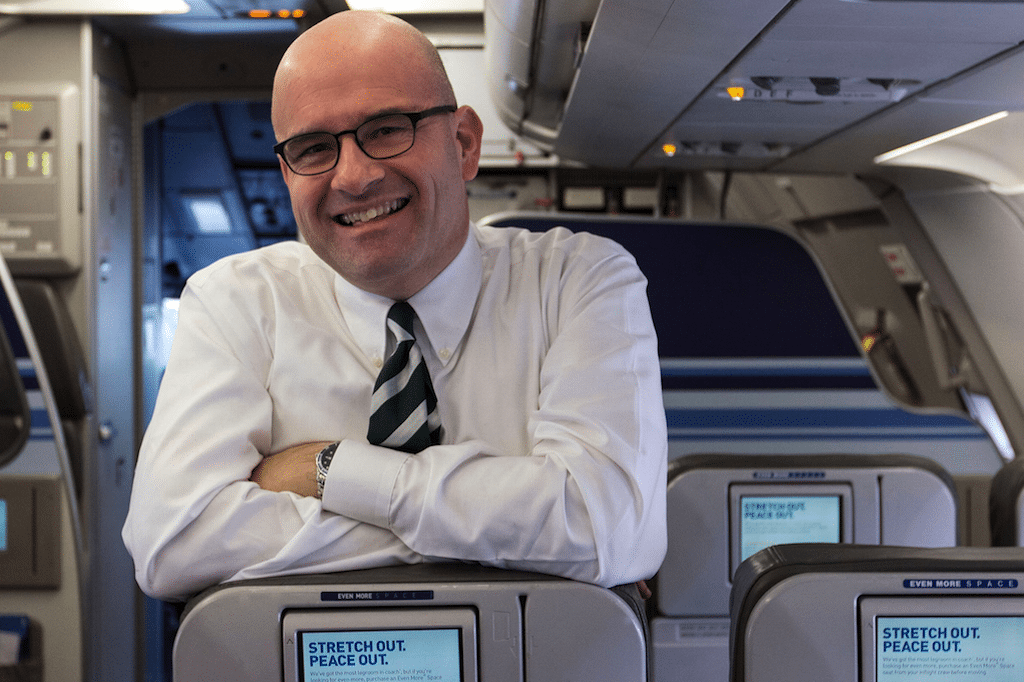Skift Take
JetBlue management is obviously upset that it couldn't consummate the deal with Virgin America because of the key importance of transcontinental expansion. But JetBlue didn't want a merger at any price and now it is going to play hardball in trying to steal away Virgin America's potentially alienated customers.
JetBlue’s talks to acquire Virgin America were the New York-based airline’s first-ever merger discussions in its 16-year history but the $2.6 billion in cash that Alaska Airlines ended up paying to acquire Virgin America “didn’t really make a lot of sense for us.”
That was the take of Marty St. George, JetBlue’s executive vice president, commercial & planning, who sat down with Skift at the airline’s headquarters in Queens, New York, yesterday and discussed JetBlue’s thinking about its ill-fated merger talks with Virgin America.
“We’ve been in business for 16 years. We have never looked at any inorganic growth. So this is the first time we’ve had any conversation about the possibility of merging with another airline,” St. George said.
That statement would lend credence to JetBlue’s denials in 2012 that it had any interest in a marriage with American Airlines despite much speculation at the time to the contrary.
In recent weeks, though, with Virgin America up for sale, both Alaska and JetBlue made bids for Virgin America in part because of its strong West Coast presence. Eliminating a competitor, albeit a relatively small one, might also have been part of the airlines’ considerations.
“The transcontinential market is extremely important to us,” St. George said April 12. “We are at the point now where New York-L.A. and New York-San Fran are the number one, number two revenue markets in the entire airline. Very, very important markets for us. We know how successful Mint has been. We want to expand it.”
On Tuesday, a week after Alaska Airlines and Virgin America announced their pending merger, JetBlue revealed it will expand its premium Mint service, including its lie-flat seats, beyond New York and Boston to Los Angeles and San Francisco, as well as select destinations in the Caribbean, to four new cities: Fort Lauderdale, Las Vegas, San Diego and Seattle. Alaska Airlines is based in Seattle.
As much as JetBlue coveted Virgin America for its West Coast strength, St. George said the amount Alaska ultimately will pay for Virgin America — $2.6 billion — didn’t make sense for JetBlue.
“I think seeing that a company like Virgin America was up for sale that has a strong transcontinental franchise, it was obviously something we would look at,” St. George said. “You know there is a price at which that made a lot of sense for us. I think the price that ended up being the final price to buy the company was a number that when you compare that to our organic options it didn’t really make a lot of sense for us.”
Plan A and Plan B
St. George said JetBlue had a plan in place if it consummated an acquisition of Virgin America and another one if the deal didn’t work out, as turned out to be the case.
“When we went into these converations about what our possible future would be with Virgin America, we knew it might work out or not work out,” St. George said. “So in our heads we had two paths. We always knew that transcon expansion was going to be part of our plan in 2016 because of the success we had in 2015. So that was always on the map.
“I think if we had consummated the deal with Virgin America we might have had a certain set of plans,” he added. “Without them we have a different set of plans, which we talked about this week.”
On Plan B, or a future without a merger with Virgin America, St. George said: “We have a great growth trajectory. We have six focus cities. Every one of them is profitalble, Every one of them is has a growth profile that we’ve laid out for it. I think the Virgin transaction was a nice-to have but it was by no means a need-to have.”
Whether that turns out to be true remains to be seen, but what’s clear about Plan B is that in addition to expanding transcontinental Mint service, JetBlue has an aggressive plan to, as St. George puts it, “steal customers from other airlines,” including Virgin America.
Taking Advantage of Brand Disharmony
JetBlue launched a marketing campaign this week urging JetBlue Virgins — those who haven’t ever flown JetBlue — to give the airline a try. The concept for the marketing campaign had been part of JetBlue’s 2016 expansion plans or in the event talks with Virgin America didn’t turn out to be fruitful.
St. George argued that JetBlue’s and Virgin America’s brands are more compatible than pairing Virgin America with the more conservative Alaska Airlines, and that JetBlue “will be in a very good spot to take advantage of it” if Virgin America customers are turned off by Alaska Airlines or the value proposition diminishes.
“… We are also out there being very aggressive trying to capture the Virgin America customer,” St. George said. “To the extent that there is someone, sort of that disgruntled customer, who’s a little bit nervous about what they love about Virgin going away with Alaska, we’re there for them. And just to be clear: It’s already a much better product than Virgin America. They should have been flying us already but we’ll give them a little extra reason.”
Those are fighting words. Game on.
The Daily Newsletter
Our daily coverage of the global travel industry. Written by editors and analysts from across Skift’s brands.
Have a confidential tip for Skift? Get in touch
Tags: alaska airlines, jetblue airways, virgin america
Photo credit: Marty St. George, JetBlue's executive vice president, commercial & planning, detailed some of the airline's thinking about its merger discussions with Virgin America. Chelsea Brodsky / JetBlue Airways
